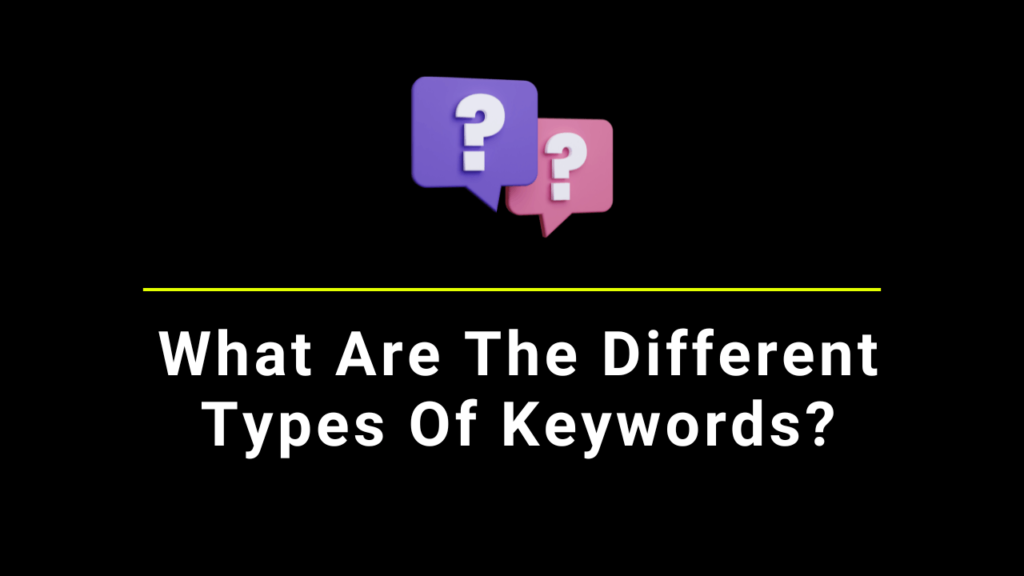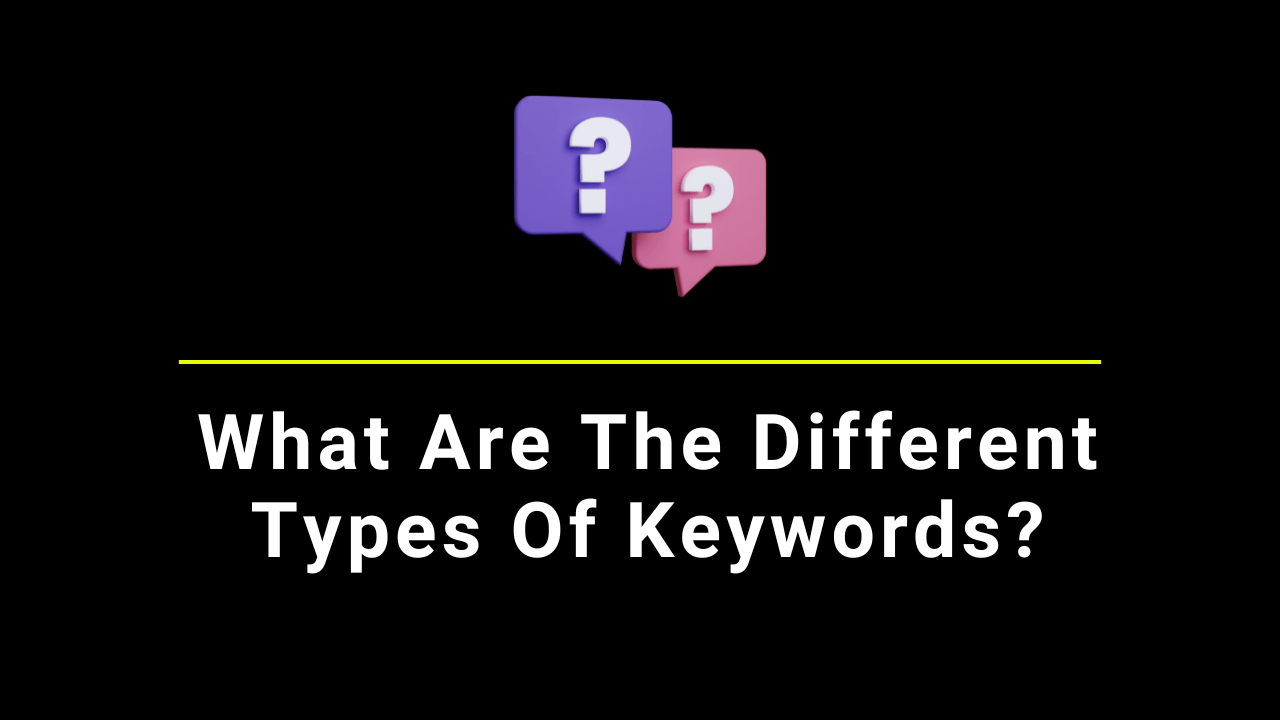If you are into blogging, you should know the different types of keywords. Finding a keyword is not that difficult, but if you do it without knowing which type of keyword you are targeting, then you are doing it wrong.
When discussing search engine optimization (SEO), keywords are the most important thing. Proper keyword research can quickly increase website visibility and drive organic traffic. But it is not that simple because you must know different types of keywords first, and then strategically, you must target them gradually.
A good website always consists of a mixture of different types of keywords. This will give an excellent reputation to search engines as well as readers as well.
In this blog post, we will explore the various keywords and discuss their relevance in optimizing your content for search engines. I will share relevant examples of each type of keyword so that you can easily understand.
11 different types of keywords you must know in 2023

1. Broad Match Keywords
Broad match keywords are relatively generic phrases or words with a comprehensive search scope. These keywords are general and may not have a specific intent or target audience. You can call them SEED keywords, also.
For example, a broad match keyword like “shoes” can encompass various types of shoes, brands, and styles. While these keywords can generate high search volume, they may also bring in irrelevant traffic and may not convert well.
2. Exact Match Keywords
As the name suggests, this kind of keyword will indicate something particular. These keywords provide a higher level of targeting and are often more effective in driving relevant traffic. For instance, an exact match keyword like “black leather dress shoes” is more likely to attract users looking for that specific product. Another example could be like best cheap web hosting with free domain name. As they have a particular search intent, the volume of such keywords will be very less.
3. Long-Tail Keywords
Long-tail keywords are search terms with three or more words. These keywords are more targeted and have lower search volume but higher conversion rates. Long-tail keywords often indicate that the user has a clear intent and is seeking something specific. For example, “best running shoes for flat feet” is a long-tail keyword that targets a niche audience and indicates a particular need.
4. Short-Tail Keywords
As the name suggests, they indicate a broad category or section. These keywords have high search volume but are highly competitive. You can consider them as broad keywords or seed keywords only. I just wanted to cover this term here as this type of keyword is also very popular.
For example, a short-tail keyword like “web hosting” is general and covers many topics within the web hosting industry. Short-tail keywords may be challenging to rank for due to the high competition, but they can generate significant traffic if optimized effectively.
5. Informational Keywords
These kinds of keywords are the most searched terms online. In fact, this is what we are looking for online. These keywords often start with words like “how to,” “what is,” or “tips for.” For instance, “how to rank higher in Google search” or “why SEO audit is important” are examples of informational keywords. While these keywords may not directly lead to sales, they can be valuable for driving traffic, building brand authority, and nurturing leads.
6. Commercial Keywords
Commercial keywords are often used by users who are ready to purchase or are in the consideration phase of their buyer’s journey. These keywords are usually more specific and include terms like “buy,” “best,” “discount,” or “reviews.” For example, “Best Web Hosting Black Friday Deals” or “best budget laptops for bloggers” are commercial keywords that target users actively looking to purchase. These keywords are best for affiliate marketing and generate good income. You will find many such articles on my blog, where I have optimized them for those search queries.
7. Branded Keywords
Branded keywords include the name of a specific brand, company, or product. These keywords are directly associated with your brand and are often used by users familiar with your business. For example, “Hostinger Coupon” or “Nexcess Review” are branded keywords. Optimizing for branded keywords is crucial for maintaining brand visibility and ensuring that users searching for your specific products or services find your website easily.
8. Competitor Keywords
Competitor keywords are keywords that target your competitors’ brands or products. These keywords can effectively attract users by comparing brands or looking for alternatives. For instance, if you’re a restaurant competing with a popular chain, you might target keywords like “best alternatives to [competitor’s name].” While using competitor keywords can be strategic, it’s essential to ensure that you comply with ethical practices and avoid misleading users.
9. Local Keywords
Local keywords are specific to a particular geographic location and are crucial for businesses targeting a local audience. These keywords often include city or region names, such as “best pizza in New York City” or “dentist in Los Angeles.” Optimizing for local keywords helps businesses appear in local search results and attracts users actively seeking local products or services.
Here I want to mention Geo Targeted keywords also. It’s not specific to local SEO keywords, rather I would say country-specific search terms. E.g. if you are looking for a good hosting company for Indian traffic websites, you will search for Best Web Hosting Services in India.
10. LSI Keywords
Gone are the days when you can quickly type the primary keyword or its various versions many times, and your article can rank higher. But in 2023, SEO has wholly transformed, and search engines become very smart. That’s where come LSI (Latent Semantic Indexing) keywords come in.
These terms and phrases are semantically related to your primary keywords. Search engines use LSI keywords to understand the context and relevance of your content. These keywords help search engines determine your page’s topic and can improve your overall search rankings.
For example, if your primary keyword is “dog training,” LSI keywords could include “puppy obedience,” “positive reinforcement,” or “canine behavior.” Including LSI keywords naturally within your content can enhance its comprehensiveness and search engine visibility.
11. Negative Keywords
You must understand negative keywords when you don’t want your content to appear for a few search terms. These keywords are primarily relevant for pay-per-click (PPC) advertising, where you want to prevent your ads from appearing for irrelevant searches.
For example, if you sell luxury watches, you might add negative keywords like “cheap” or “imitation” to ensure your ads don’t appear for users searching for inexpensive or counterfeit watches. By using negative keywords strategically, you can improve the targeting of your ads and maximize your budget.
Conclusion: Which keyword type to target?
So, I am sure you got enough information about different types of keywords in this article. I tried to cover every possible type of keyword that we mainly covered while creating a website.
Understanding the different types of keywords is essential for effective SEO. You can improve your website’s visibility, attract relevant traffic, and increase conversions by strategically incorporating a mix of all types of keywords into your content.
Remember to conduct thorough keyword research, analyze search intent, and optimize your content accordingly to maximize the impact of your SEO efforts.







